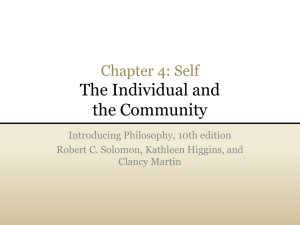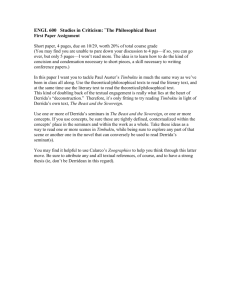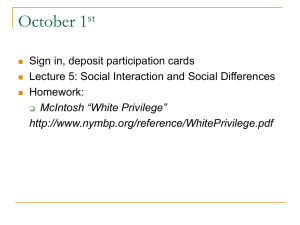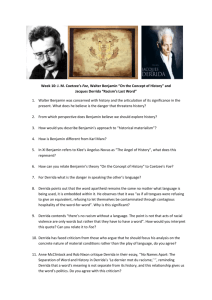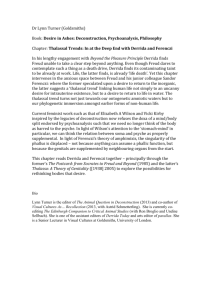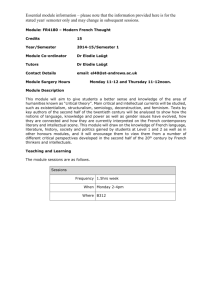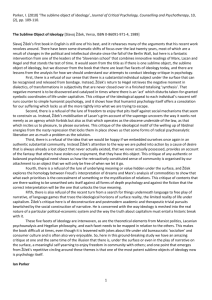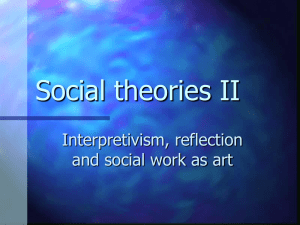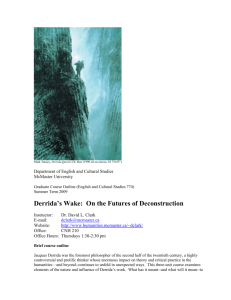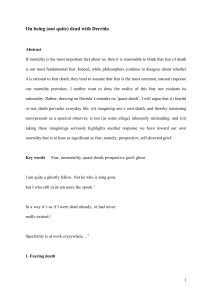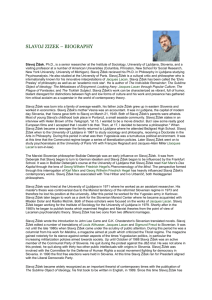Flintstone Wilma Flintstone Mr. Porter AP English Literature 13
advertisement
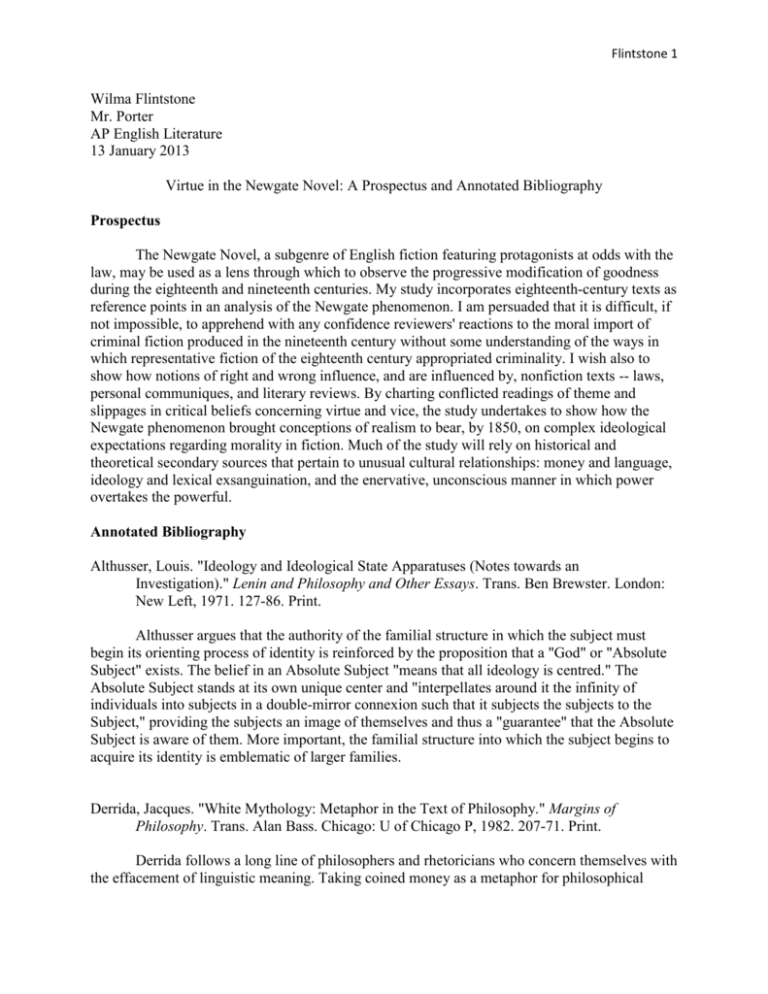
Flintstone 1 Wilma Flintstone Mr. Porter AP English Literature 13 January 2013 Virtue in the Newgate Novel: A Prospectus and Annotated Bibliography Prospectus The Newgate Novel, a subgenre of English fiction featuring protagonists at odds with the law, may be used as a lens through which to observe the progressive modification of goodness during the eighteenth and nineteenth centuries. My study incorporates eighteenth-century texts as reference points in an analysis of the Newgate phenomenon. I am persuaded that it is difficult, if not impossible, to apprehend with any confidence reviewers' reactions to the moral import of criminal fiction produced in the nineteenth century without some understanding of the ways in which representative fiction of the eighteenth century appropriated criminality. I wish also to show how notions of right and wrong influence, and are influenced by, nonfiction texts -- laws, personal communiques, and literary reviews. By charting conflicted readings of theme and slippages in critical beliefs concerning virtue and vice, the study undertakes to show how the Newgate phenomenon brought conceptions of realism to bear, by 1850, on complex ideological expectations regarding morality in fiction. Much of the study will rely on historical and theoretical secondary sources that pertain to unusual cultural relationships: money and language, ideology and lexical exsanguination, and the enervative, unconscious manner in which power overtakes the powerful. Annotated Bibliography Althusser, Louis. "Ideology and Ideological State Apparatuses (Notes towards an Investigation)." Lenin and Philosophy and Other Essays. Trans. Ben Brewster. London: New Left, 1971. 127-86. Print. Althusser argues that the authority of the familial structure in which the subject must begin its orienting process of identity is reinforced by the proposition that a "God" or "Absolute Subject" exists. The belief in an Absolute Subject "means that all ideology is centred." The Absolute Subject stands at its own unique center and "interpellates around it the infinity of individuals into subjects in a double-mirror connexion such that it subjects the subjects to the Subject," providing the subjects an image of themselves and thus a "guarantee" that the Absolute Subject is aware of them. More important, the familial structure into which the subject begins to acquire its identity is emblematic of larger families. Derrida, Jacques. "White Mythology: Metaphor in the Text of Philosophy." Margins of Philosophy. Trans. Alan Bass. Chicago: U of Chicago P, 1982. 207-71. Print. Derrida follows a long line of philosophers and rhetoricians who concern themselves with the effacement of linguistic meaning. Taking coined money as a metaphor for philosophical Flintstone 2 language, Derrida shows that words, like coins, begin a process of effacement once they have been launched into circulation, and particularly once they become "exchanged" for other words. The process of metaphorization reveals the working of differánce in a dialogue taken from Anatole France's The Garden of Epicurus. Derrida notices that the verbal exchange between Aristos and Polyphilos analogizes, through the image of coin effacement, the possibility of restoring "the sensory figure which is sheltered and used (up), to the point of appearing imperceptible, in every metaphysical concept" (210). The assumption of the conversants , is that there is "the possibility of restoring, or reactivating, beneath the metaphor which simultaneously hides and is hidden, the 'original figure' of the coin which has been worn away (usé), effaced, and polished in the circulation of the philosophical concept." Derrida, however, asks, "Should one not always have to speak of theeffacement of an original figure, if it did not by itself efface itself?" (211). The verbal plays on "face" and "figure" contribute to the suggestion that money and language share a deceptive "value" which is based on a problematic idea of center. Fish, Stanley. "Driving from the Letter: Truth and Indeterminacy in Milton's Areopagitica." ELH46 (1985): 214-43. JSTOR. Web. 5 Dec. 2012. * In his reading of Areopagitica, Stanley Fish disputes the twin ideas that (1) John Milton's tract argues for an unrestrained humanistic liberty and that (2) it has as its main concern the freedom of the press. Instead, Fish claims, the 1644 appeal to Parliament sabotages its own argument and thus frees the truth through a paradoxical process of driving the reader away from certainty. Areopagitica disorients its reader by building to moments of apparent security -moments in the text during which truth seems finally to have been attained --and then frustrating the attainment by problematizing the nature of the truth itself. The Areopagitica insists that its readers be "driven" from the false premise that a complete, accessible certainty exists, at least in this world. Only by engaging in an endlessly frustrating search for what is true, and by coming to terms with the impossibility of ever having it in all its completeness, can we internalize or "become" truth itself. Hay, Douglas. "Property, Authority, and the Criminal Law." Eighteenth Century Studies 45.2 (1983): 79- 85. Project Muse. Web. 6 Dec. 2012. * Hay joins with nearly every other historian who writes on eighteenth-century crime in the belief that laws for capital punishment proliferated steadily as reverence for property increased. These laws were often deficient in their applicability to situations in which hanging and transportation did not seem to fit the crime. Following parliamentary statutes to the letter would have resulted in twice as many executions, a quantity that would have had two unacceptable outcomes: (1) the mob might lose the sense of "majesty" and "terror" associated with the "spectacle" of the law -- that is, they might come to expect as a matter of course the selective pronouncements of doom at assizes and quarter sessions; and indeed it was a commonplace among the many thinkers of the century that the unexamined cruelty of the law undermined its effectiveness, perhaps contributing to the apparent increase in crime at mid- century; (2) they Flintstone 3 might be outraged by so many executions rather than lulled by so many pardons into reverence for the law and its representatives. Sekora, John. Luxury: The Concept in Western Thought, Eden to Smollett. Baltimore: Johns Hopkins UP, 1977. Print. Sekora explains that luxury was a catch-all term for moral looseness and material extravagance, problems that deeply worried the conservative writers of the day -- and the more so as they seemed to contribute to the increase of idleness, mischief, and social climbing among the working and trade classes. Sekora argues that luxury became a rhetorical (and thus political) mainstay for a conservative ideology that repeatedly sought conspiracies and evidence of criminality among the lower orders. This hunt for luxury among the inferior classes became a rallying point in an unconscious campaign to root out immorality. Žižek, Slavoj. "How Did Marx Invent the Symptom?" The Sublime Object of Ideology. London: Verso, 1989. 11-53. Print. In his revision of Marx's commodity fetishism, Žižek argues that even the most savvy and self- interested money-oriented subject are unaware of their implication in an insidious system. It is not that they do not recognize their implication within their respective ideologies; otherwise, they would never be able to articulate their consciousness -- or at least their belief -- that they are acting against those ideologies. People delude themselves into believing in their own "freedom." Even those who realize that they are not free delude themselves when they believe that they are "free" to interact profitably with other subjects in a capitalistic ideology. They are aware that money is a commodity, but they structure their lives, as do the people they victimize, as though this is not the case.
